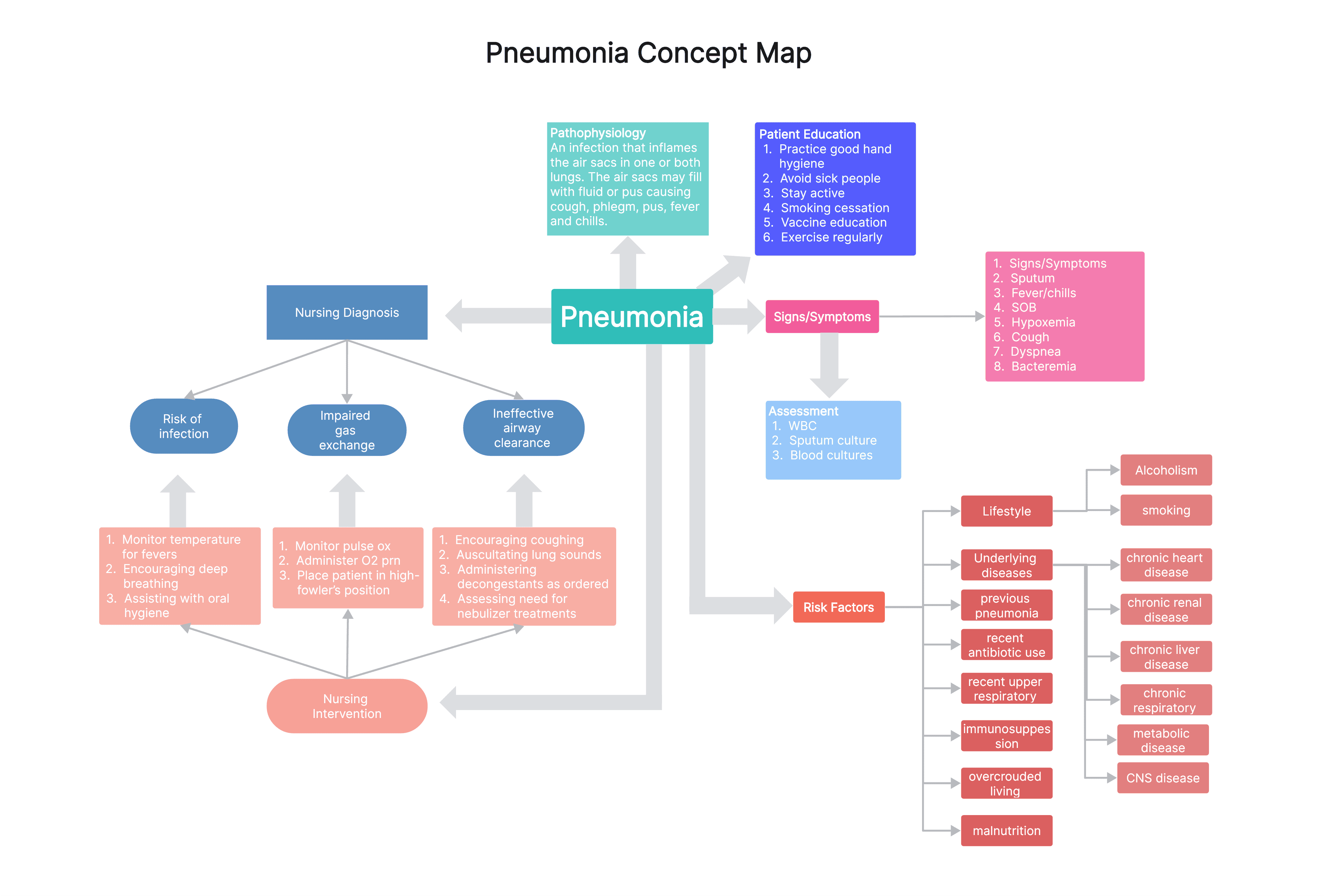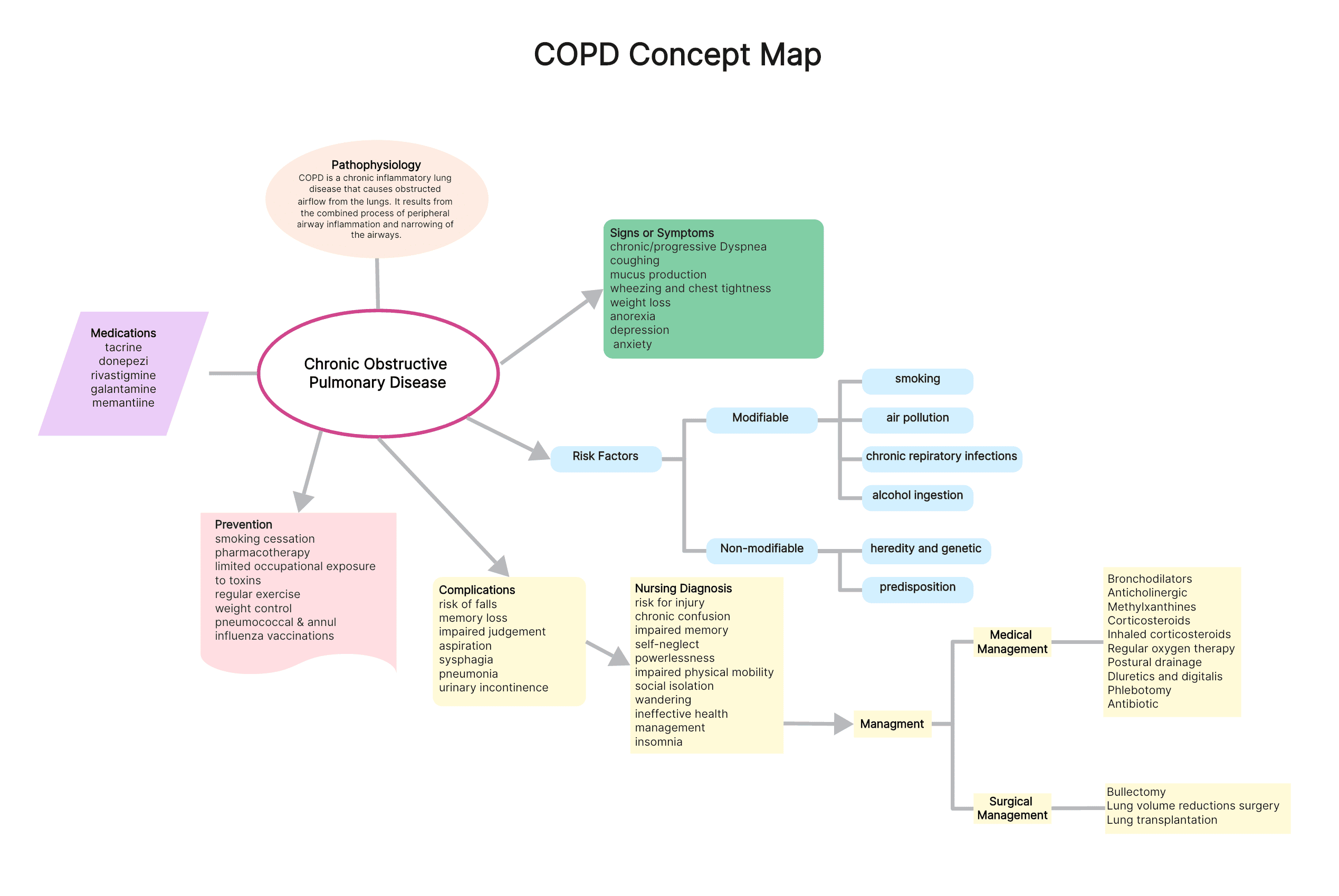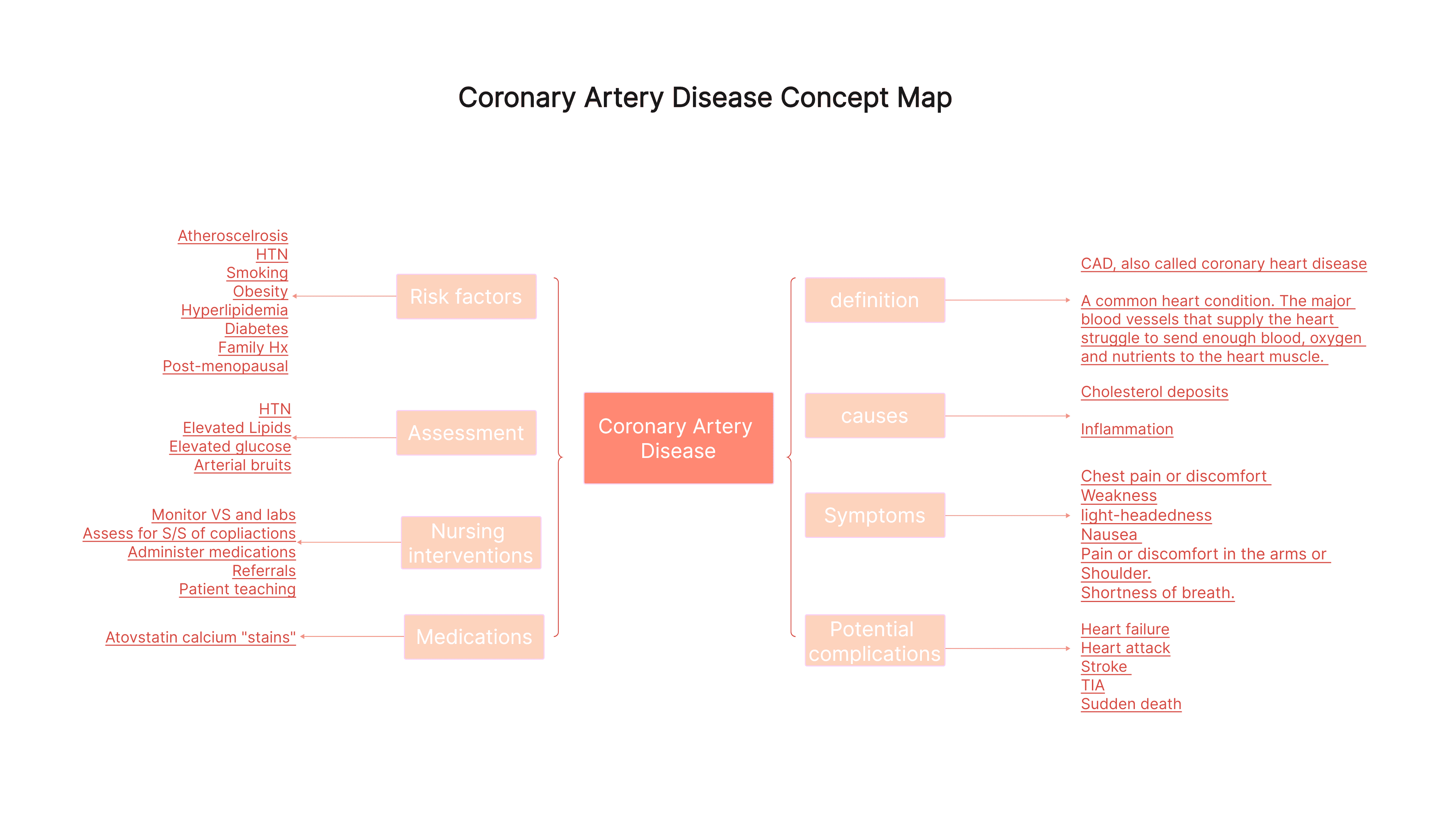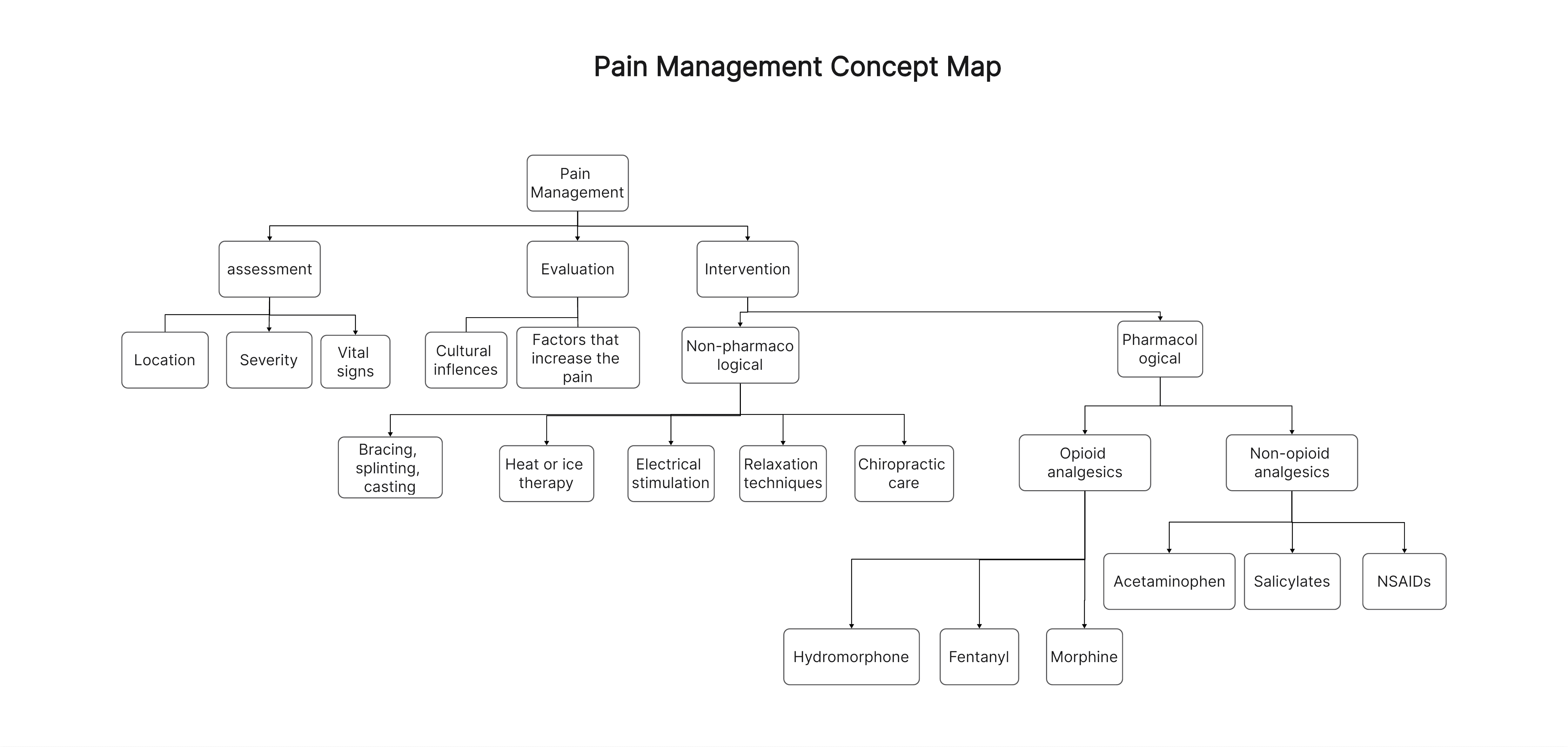About This Template
Feeling lost in a sea of medical jargon? Pneumonia, a lung infection, can be confusing. Our FREE Pneumonia Concept Map Template offers a clear visual framework to organize information and gain a deeper grasp of this condition.
What is Pneumonia?
Pneumonia occurs when the air sacs (alveoli) in your lungs become inflamed due to infection. These air sacs are essential for gas exchange, allowing oxygen to enter your bloodstream and carbon dioxide to be expelled. When they become inflamed, they fill with fluid or pus, making breathing difficult and hindering oxygen delivery throughout your body.
There are several types of pneumonia, each with its own cause:
- Bacterial pneumonia: The most common type, caused by bacteria that enter the lungs through inhalation. Common bacterial culprits include Streptococcus pneumoniae and Haemophilus influenzae.
- Viral pneumonia: Caused by viruses that infect the respiratory tract, sometimes progressing to pneumonia. Common viruses include influenza (flu), respiratory syncytial virus (RSV), and rhinovirus.
- Aspiration pneumonia: Occurs when you inhale fluids, such as vomit or stomach contents, into your lungs. This can happen due to swallowing difficulties, impaired consciousness, or certain medical procedures.
- Fungal pneumonia: Less common, caused by inhaling fungal spores. This type is more likely to occur in people with weakened immune systems or chronic lung conditions.
Symptoms and Causes of Pneumonia
The symptoms of pneumonia can vary depending on the type of infection, your age, and overall health. However, some common symptoms include:
- Cough: This is a hallmark symptom of pneumonia, often producing green, yellow, or blood-tinged mucus (phlegm).
- Fever: Your body temperature may rise significantly, often exceeding 100.4°F (38°C).
- Chills: You may experience frequent shivering sensations.
- Shortness of breath: This can occur even at rest, making even simple activities like walking challenging.
- Rapid, shallow breathing: Your body may try to compensate for difficulty breathing by taking more frequent, shallow breaths.
- Chest pain: This pain may worsen with coughing or deep breathing and can be sharp or stabbing.
- Fatigue: You may feel unusually tired and have a lack of energy.
- Headache: Headaches can accompany pneumonia, especially with fevers.
- Loss of appetite: You may experience a reduced interest in food.
- Confusion: In some cases, particularly in older adults, pneumonia can lead to confusion or delirium.
Risk factors for developing pneumonia include:
- Age: Infants and older adults are more susceptible to pneumonia. Their immune systems are either not fully developed or weakened with age, making them more vulnerable to infection.
- Chronic health conditions: Conditions like asthma, chronic obstructive pulmonary disease (COPD), and heart disease increase your risk. These conditions can damage your lungs or make it harder to clear mucus, creating a breeding ground for infection.
- Smoking: Smoking weakens your lungs' defenses and irritates the airways, making them more susceptible to infection. The chemicals in cigarettes damage the cilia, tiny hairs that help clear mucus and germs from your lungs.
- Weakened immune system: Conditions or medications that suppress the immune system can increase your risk. This includes HIV/AIDS, certain autoimmune diseases, and medications like chemotherapy.
- Recent hospitalization or surgery: Hospitalization can expose you to germs in healthcare settings, and certain surgeries can make it harder to clear fluids from your lungs due to pain or sedation.
FAQ About the Pneumonia Concept Map
Who can benefit from using this template?
Anyone interested in understanding pneumonia, including patients, healthcare professionals, and individuals concerned about their respiratory health.
What information should be included in the concept map?
Definition of pneumonia, symptoms, causes, risk factors (smoking, chronic illness, age), nursing diagnoses (impaired gas exchange, ineffective airway clearance), and patient education tips (cough hygiene, medication adherence).
Can I customize this template?
Absolutely! This is a flexible tool. Adapt it to include specific details relevant to your situation or area of interest.
Free Download Your Pneumonia Concept Map Template!
Ready to breathe easier with a clearer understanding of pneumonia? Download our FREE template today! Click the Use Template button on this article to access this valuable resource.
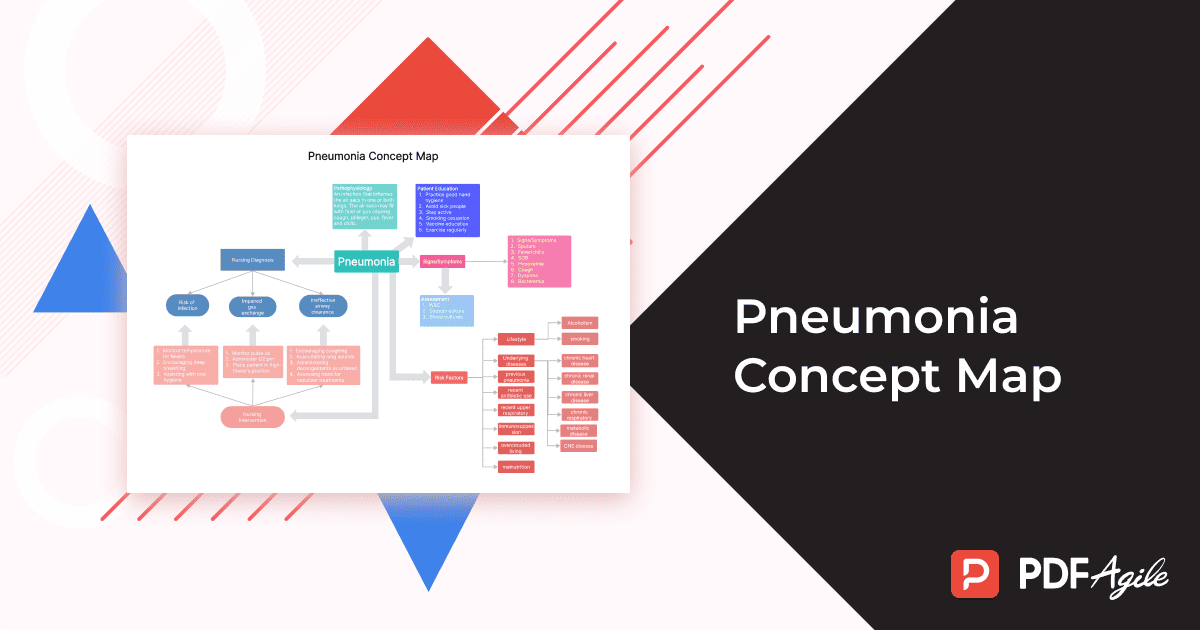
Take Control of Your Respiratory Health
Pneumonia concept maps are a valuable tool for both patients and healthcare professionals. By downloading our free template and utilizing its visual framework, you can gain a deeper understanding of this infection, empower yourself to make informed decisions, and ultimately, breathe easier!

